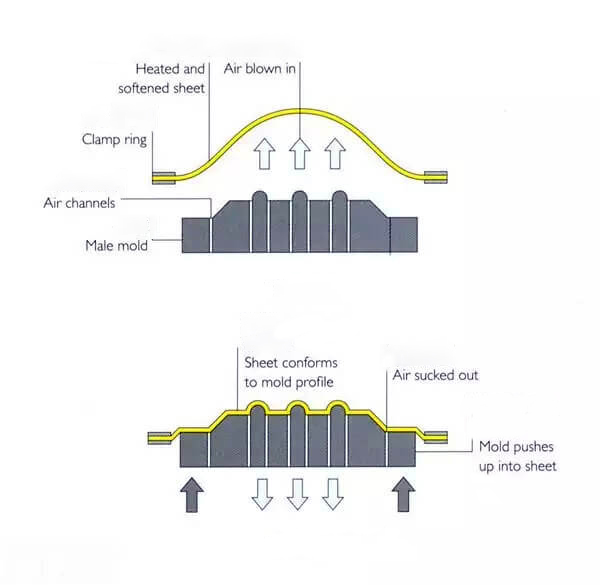
Specialize in Compression molds

Specialize in Compression molds
 With the development of lightweight, when the weight of parts is reduced, it also needs to meet the requirements of high strength. Thermoforming is a way to meet these requirements. It is suitable for forming complex, high-strength compounds for custom applications. Generally, these parts are lighter than metal and have an equal or greater strength-to-weight ratio.
With the development of lightweight, when the weight of parts is reduced, it also needs to meet the requirements of high strength. Thermoforming is a way to meet these requirements. It is suitable for forming complex, high-strength compounds for custom applications. Generally, these parts are lighter than metal and have an equal or greater strength-to-weight ratio.
Thermoforming can be divided into vacuum forming and compression moulding according to the pressing method. Thermoforming is a special plastic moulding method for processing thermoplastic sheets into various products. The sheet is heated to a softening state, and under the action of external force, it is close to the thermoforming mould surface to obtain the same shape as the mould surface. After cooling and shaping, the product is finished after dressing. sheet is heated to about 950°c making the material more elastic. Even complex parts can be put into little material to form. After rapid quenching, the strength of 1500 n/mm can be reached.
Since the steps of thermoforming are simple and straightforward, the process is suitable for high-volume manufacturing of molded products due to its fast turnaround time. Thermoplastic sheets are continuously fed into the heating chamber and formed. In some operations, the extruder that produces the thermoplastic sheet is placed upstream of the thermoforming machine and therefore requires less heat. Manufacturing devices are often designed as molds with multiple cavities so that multiple parts can be produced in each punch stroke.
The most common thermoforming techniques use moulds to form plastic sheets into finished parts, mainly including vacuum forming, pressure forming. The moulds needed for the thermoforming process can be developed using a variety of manufacturing processes, including hand-carved wood, CNC machining, 3D printing, or casting plaster.
Thermoforming temperature: Depending on the material being thermoformed, the mould may require higher thermal resistance. Including cooling channels in the mould can increase cooling rates and shorten cycle times.
Thermoforming pressure: The mould should be strong enough to withstand the forming forces involved in the process, such as vacuum forces, pressure, or mechanical action. The strength of these forces will depend on the material type, sheet specification, and requirements for part quality such as surface finish and level of detail.
Mould Design Features: Moulds should include key features such as multiple vents to circulate air during the moulding process and draft angles to aid part release.
Mould Surface Finish: The requirements for part quality, such as surface finish, level of detail, dimensional accuracy and stability, are taken into account when making tools.
Mould raw material: In the mould production process, the selection of raw materials is very important. The producer needs to consider many factors, such as material hardness, ductility, dimensional stability, workability, wire cutting processability, surfacing, polishing, hardenability and Impact resistance, etc. When designing thermoforming moulds, different materials must be selected according to different usage conditions to ensure the service life of the mould, because the service life of the mould directly affects the quality and cost of the finished product. In the field of thermoforming moulds, it is extremely important to avoid cracking and wear resistance. Therefore, strength, wear-resistance and toughness limits are one of the main considerations for selecting mould materials.
Thermoforming mould process: The wear resistance of thermoforming moulds will directly affect the life of the mould, so mould manufacturers will use the quenching process to process the thermoforming mould to increase the hardness and wear resistance and extend the service life of the mould. After quenching and other heat treatments, the mould material will show a more uniform and dense metal structure and improve its comprehensive mechanical properties. China mould companies usually use two methods to process moulds, one is the traditional grinding process used by most companies, and the other is the high-speed hard milling process used by a few companies. Compared with traditional grinding processing, high-speed hard milling processing has the advantages of good flexibility, no pollution and high production efficiency. Our manufacturing experience allows us to use current CNC milling technology and traditional methods to produce thermoforming moulds. In general, the processing of thermoforming mould has a certain degree of complexity.
Thermoforming mould have various applications in almost all industries. MDC mould supply a variety of long-term accurate operation of the thermoforming moulds. It makes a variety of items used in the production of food, hotels, medicine, fast-moving consumer goods and other industries. Compared with other processing methods, thermoforming has the advantages of cheap moulds and uniform thickness of the finished product.
MDC is the mature thermoforming mould manufacturer, our thermoforming mould suitable for different specifications of hot forming machines such as Europe. MDC mould experts in all types of thermoforming moulds, including vacuum form, pressure form, heavy-gauge, thin-gauge, and twin-sheet thermoforming. Our thermoforming mould engineers have extensive experience and can help you design and implement mould procedures to produce various thermoformed plastic parts. Innovative technology is constantly applied and developed in the MDC. MDC mould ability to manufacture first-class thermoforming mould is based on long experience accumulation and high strength research. We will continue to serve the global mould market.

Contact US
Email: master@zjmdc.com
Tel: +86 576 84616076
Fax: +86 576 84616079
Mobile: +86 13906573507(Mr. Wang)
Address: No.116 mochuang road, Huangyan Xinqian street,Taizhou,Zhejiang,China